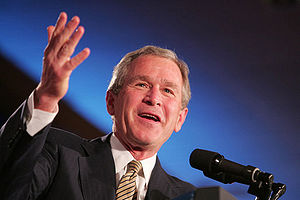Disfluencies are utterances that interrupt the flow of speech that include pauses, mid-phrase interruptions, repeated words, restarted sentences, made-up words, and words with elongated pronunciation.1 Disfluencies are commonly used by all races, genders, and people of all ages. According to current research on disfluencies, there is said to be a significant relationship between filler words and quality conversation. A question that is frequently asked is, “Do disfluencies interrupt the natural flow of conversation?” And the answer is no. Filler words are proven to enhance natural conversations. So, were George W. Bush’s Bushisms effective in his public speeches?

The former president of the United States George W. Bush religiously used unconventional statements, malapropisms, and linguistic errors in his public speeches, and they have come to be called Bushisms.2 A president practicing incorrect word use? It happens. The use of disfluencies is natural and used by everyone. Although Bush’s speeches were prepared in advance, he commonly misplaced words and spoke in the wrong context. Bushisms are quite funny to listen to. In fact, they seem to keep the listener engaged. For example, Bush once said, “you teach a child to read, and he or her will be able to pass a literacy test,” in Townsend, TN on February 21, 2001.3 This statement caught the listeners’ attention, and even made them laugh a bit. According to Martin Corley and Robert Hartsuiker’s research, the regular pauses in natural conversation benefit the listener.4 In this article, “Why ‘Um’ Helps Auditory Word Recognition: The Temporal Delay Hypothesis,” first published in PLOS One in May 2011, researchers Corley and Hartsuiker propose a hypothesis that any delay caused by disfluencies in language can actually benefit listener’s word recognition.5

The purpose of their experiment was to prove that sentence fillers can actually improve the reaction time of the listener’s word recognition process. Although this experiment does not fully explain why we use sentence fillers, it only shows the benefit in our speech by using disfluencies.6 George W. Bush may have used a lot of different types of disfluencies in his public speeches, but the public truly understood the point that he was making. The disfluencies or pauses allow the public time to process Bush’s words and their meaning, in order to understand the meaning of his speech. Using disfluencies do not have a negative connotation on language use, although many people believe it does. Proof that one of our recent presidents, George W. Bush, regularly used disfluencies in public communication, shows that they do not interrupt the main point of the conversation or speech.7

Another question frequently asked is whether there are such things as gender differences in linguistics? According to many linguists, the answer is yes. But have you ever heard that certain words can correlate to a specific age or gender? Recent studies have shown that filler words or disfluencies can correlate to the gender and/or age of the speaker. Bush commonly used the disfluency “you know,” which according to research correlates significantly with older men. Many experiments suggest that the frequency of certain disfluencies correlates to gender and age. In a study published in 2010, William Horton, Daniel Spieler, and Elizabeth Shriberg examined age-related changes in language production. The authors assert that one’s age is associated with the speed of one’s speech and filled pauses one uses in conversation. Horton et al. observed this relationship of age and language through experiments in which people of different ages, ranging from 17-68, were randomly selected.8 Once the authors gathered their participants, they tested the age-related differences in their language by recording all the conversations of the participants on the telephone. The authors observed the data collected, and discussed the significance of the data with the relationship of age and language. Horton et al. confirmed their initial hypothesis, that speakers generally speak more slowly and become less fluent with age.9
Macaulay’s experiment provided many transcribed recordings of age and gender differences with the filler word “you know.”10 The evidence collected shows a significant correlation between the use of filler word “you know” and older men. This shows the generational difference in language as well as the gender difference too. Younger people tend to use the filler words “um” and “like,” while older people tend to use “you know” and “uh.” Researchers are unsure why filler words have also became generational, although there is significant evidence in Macaulay’s experiment to prove that filler words correlate to both gender and age.11 In this article, “You Know, It Depends,” first published by The Journal of Pragmatics in 2000, Ronald Macaulay tests the relationships of the word “you know” with age, gender, and social class. Macaulay asserts his hypothesis of the correlation of age, gender, and social class with the filler word “you know.” Macaulay created an experiment with test subjects in Scotland, in which twelve people of different ages, genders, and social classes were selected to be interviewed.12 Macaulay collected the data from the experiment and noted the total number of words recorded in each person’s interview. Macaulay then listed the total number of times an interviewee used the word “you know” in order to test his hypothesis of the relationship.13 Macaulay reports that there is a sufficient amount of evidence to support his hypothesis.14 This is evidence to further the reasoning of Bush’s use of disfluencies, and the correlation of gender and age to filler words; disfluencies are natural and help the flow of conversation.

Another famous Bushism is “They misunderestimated me,” spoken in Bentonville, AR on November 6, 2000. With this Bushism, Bush added “mis” to underestimated. Bush unknowingly misused a word. Many believe that Bush used these Bushisms on accident, and it made him seem more like an average man rather than the President of the United States. The relationship between the people and their president is based on politics of course, but also on the similarities that they share as people. If Americans felt that Bush was like the common man, they would have a closer relationship.15 The Bushisms used by Bush made him seem more human, and gave Americans a stronger sense of relate-ability to their President. With these Bushism, Bush reinforced the idea that “everyone put their pants on one leg at a time.” Some believe that Bush spoke these Bushisms out of ignorance, but many linguists believe that it had to do with the amount of pressure put on him.16 Associate professor of linguistics Alan Cienki said, “It is something that we all do, some more than others, some of us do it more under pressure, in the spur-of-the-moment situations. Being a world leader definitely puts you in that high-pressure category.”17 Linguists also say that people are just waiting for famous political leaders to make a mistake in order to call them out on it.18
With the research conducted by myself and other linguists, I believe that Bushisms are effective in his public speeches. The Bushisms allowed the listeners to think deeper about what Bush said, cause the listeners to be engaged, make the listeners laugh, and allow Bush to relate to the common man. Overall, disfluencies in conversation are beneficial, and still efficiently address the main point of conversation. Bushisms have enhanced the engagement of the listeners in each speech. Although Bushisms were often thought of as a display of ignorance, they are rather beneficial in Bush’s speeches.
- William S. Horton et al., “A Corpus Analysis of Patterns of Age-Related Change in Conversational Speech,” Psychology & Aging, vol. 25, no. 3 (Sept. 2010): 708. ↵
- “Bushisms: The Second Coming,” Ecologist 35, no. 2 (2005): 2. ↵
- “Bushisms: The Second Coming,” Ecologist 35, no. 2 (2005): 2. ↵
- Martin Corley and Robert Hartsuiker, “Why ‘Um’ Helps Auditory Word Recognition: The Temporal Delay Hypothesis,” Plos ONE, vol. 6, no. 5 (May 2011): 4. ↵
- Martin Corley and Robert Hartsuiker, “Why ‘Um’ Helps Auditory Word Recognition: The Temporal Delay Hypothesis,” Plos ONE vol. 6, no. 5 (May 2011): 1. ↵
- Martin Corley and Robert Hartsuiker, “Why ‘Um’ Helps Auditory Word Recognition: The Temporal Delay Hypothesis,” Plos ONE, vol. 6, no. 5 (May 2011): 6. ↵
- “Bushisms: The Second Coming,” Ecologist 35, no. 2 (2005): 2. ↵
- William S. Horton et al., “A Corpus Analysis of Patterns of Age-Related Change in Conversational Speech,” Psychology & Aging, vol. 25, no. 3 (Sept. 2010): 710. ↵
- William S. Horton et al., “A Corpus Analysis of Patterns of Age-Related Change in Conversational Speech,” Psychology & Aging, vol. 25, no. 3 (Sept. 2010): 713. ↵
- “Bushisms: The Second Coming,” Ecologist 35, no. 2 (2005): 9. ↵
- Ronald Macaulay, “You Know, It Depends,” Journal of Pragmatics, vol. 34, no. 6 (June 2002): 749. ↵
- Ronald Macaulay, “You Know, It Depends,” Journal of Pragmatics, vol. 34, no. 6 (June 2002): 749. ↵
- Ronald Macaulay, “You Know, It Depends,” Journal of Pragmatics, vol. 34, no. 6 (June 2002): 749. ↵
- Ronald Macaulay, “You Know, It Depends,” Journal of Pragmatics, vol. 34, no. 6 (June 2002): 749. ↵
- Klara Hrozinkoya, “Bushisms: a linguistic analysis of G.W. Bush’s slip-ups,” (Thesis, Masaryk University, 2010), 22. ↵
- Klara Hrozinkoya, “Bushisms: a linguistic analysis of G.W. Bush’s slip-ups,” (Thesis, Masaryk University, 2010), 22. ↵
- Klara Hrozinkoya, “Bushisms: a linguistic analysis of G.W. Bush’s slip-ups,” (Thesis, Masaryk University, 2010), 22. ↵
- Klara Hrozinkoya, “Bushisms: a linguistic analysis of G.W. Bush’s slip-ups,” (Thesis, Masaryk University, 2010), 22. ↵




25 comments
Isaac Rodriguez
I have a bad habit of saying “uhh,” and “umm” when speaking, especially when in front of an audience, or speaking to elders. I try to choose my words carefully, and in doing so, I tend to add an “um” in between thoughts. Being president of the United States, I’m sure nervousness caused Bush to make errors in his speeches. While it is a possibility, I do not think he had made these errors on purpose in order to gain the attention of his audience.
Noah Laing
I had no idea that these phrases were referred to Bushism’s, this article was very entertaining. I definitely use “um” daily and used to have a bad habit of saying “like” repeatedly. President Bush’s use of these phrases gave him a more appealing image as he didn’t seem so formal and robotic with all his speeches.
Jason Garcia
Through various speech classes, I learned that “um and Uh” are unprofessional in the world of public speaking. but this article helps me to understand the uses of it. Instead of reading they may give off a passionate viewpoint. I found the picture of Bush funny but I also hoped he didn’t say that because its just improper English, so I think a balance I should be found when people are using certain methods and talking to certain people
Arianna Kennet
As far as I knew, words such as “umm” “uh” “you know”, were the most unprofessional, sloppy sounding words when speaking, especially when giving a formal speech or talk. The thing is, whenever I tried speaking without those extra words, it was straight up a struggle, sometimes leaving me stuttering trying to finish, start or continue my sentence. Reading this article, I had no idea before this that bushism was even a thing, it even sounds funny. I guess you learn something new everyday.
Auroara-Juhl Nikkels
Your article made me laugh quite a few times, especially at the picture of President George Bush looking stressed out during a speech. I did not know that there were things called Bushisms. I use “UM” and “like” like crazy. I think that, according to your article, President Bush’s frequent mishaps during his speeches brought him a little closer to the people and made him seem more personable.
Christopher King
I enjoyed this article partly because I grew up listening to the Bushisms and became accustomed to his speeches. The article talks in defense of how his speeches were made and how he made himself seem to the public. Sure many viewed him as more relatable but many had viewed him to be dumb and incomepetant because of the vocabulary he used. Many think that he would have been a great president if we had not gone to war but I believe he did well in the circumstances.
Natalie Childs
I think this was a great article. I had never thought in the way that disfluencies are used. It totally makes sense that our brains need time to process what it being said to us, especially when it is things that hold some importance. What I also found interesting is that while the word choice is tells something of the speaker (um vs uh etc), which is actually used isn’t whats important, just that pauses that they fill in the speech.
Carlos Vazquez
Growing up in the early 21st century, I became familiar with the controversy often caused by President Bush’s use of peculiar words. The television show Saturday night live famously used “Bushisms” to mock the former presidents choice of words. I like how this article not only talked of these “Bushisms” but it also defined what disfluencies are and how they are used in our language.
Jose Figueroa
Reading the name of the article I had no idea what a “bushism” was and it really caught my attention. I really enjoyed how you broke down how important language is and how it varies depending on age and gender. After reading about it, I can know pay more attention to the disfluencies people use everyday! I also loved how you emphasized the practical use behind disfluencies! Great job.
Luis Morales
This is very interesting and informative article. My teachers have always taught me that words like, “um,” “like,” and “uh” are very unprofessional and should not be used when one gives any type of speech or presentation. It is incredible to think how something so small that we use normally can have a great deal in making conversation. That is why this article is so mind boggling about the use of disinfluencies. This article was very fascinating.